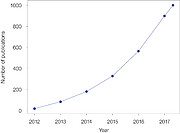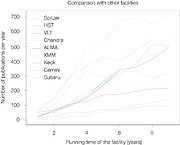Zprávy
ALMA Reaches 1000 Published Papers
3. května 2018
ALMA, the Atacama Large Millimeter/submillimeter Array, has reached an important milestone with the publication of the 1000th peer-reviewed paper using ALMA data. The paper was Spatial variations in Titan's atmospheric temperature: ALMA and Cassini comparisons from 2012 to 2015 by Alexander E. Thelen et al. — which presents a detailed investigation of the atmospheric temperature of Saturn's largest moon, Titan.
The data behind the work of Thelen et al. was originally taken to help calibrate the telescope and have been available since 2013. ALMA data is archived online, meaning many discoveries by different researchers can be made from a single observational programme, or from data taken for an entirely different purpose, as is the case here. The full range of papers presenting observations and discoveries using ALMA data is also available online from the ESO telbib database [1].
The ALMA bibliography is jointly maintained by the librarians at ESO and NRAO, together with NAOJ. This joint approach underlines the general spirit of collaboration that also characterises the ALMA project at large [2].
The first ALMA data paper appeared in 2012, and since then ALMA — the largest ground-based astronomical project in existence — has been instrumental in a wide range of discoveries including detecting the ingredients of young exoplanetary systems (eso1718), capturing galaxy assembly in the early Universe (eso1530) and detecting the formation of the first stars (eso1708). ALMA can make these discoveries by studying light with wavelengths of around one millimetre. Such light originates from some of the coldest objects in the Universe, such as the earliest and most distant galaxies in the Universe, as well as molecular clouds — dense regions of gas and dust where new stars are born.
ALMA is a single telescope composed of 66 high-precision antennas, operating at wavelengths of 0.32 to 3.6 millimetres. Its main 12-metre array has 50 antennas, each 12 metres in diameter, acting together as an interferometer. This already powerful collection of antennas is complemented by an additional compact array of four 12-metre and twelve 7-metre antennas.
Since the first data was produced by ALMA, the rate of published papers has grown rapidly, and data from this astronomically-productive powerhouse now leads to an average of one refereed scientific article per day. With 1000 papers published so far, this powerful instrument has already broadened our understanding of the most distant reaches of our Universe and will continue to help answer our cosmic queries in the future.
Notes
[1] ALMA has defined a clear citation policy for the use of data in publications so that observations can be clearly associated with publications. Information about the ALMA bibliography methodology, along with lessons learned from the first years of operation, can be found here and here.
[2] The ALMA bibliography curators are: Uta Grothkopf, Silvia Meakins and Dominic Bordelon, ESO Library, library@eso.org; Marsha Bishop, NRAO Library, mbishop@nrao.edu and Tomoko Nishikawa, NAOJ ALMA office, tomoko.nishikawa@nao.ac.jp.
More Information
ALMA, an international astronomy facility, is a partnership of ESO, the U.S. National Science Foundation (NSF) and the National Institutes of Natural Sciences (NINS) of Japan in cooperation with the Republic of Chile.
Odkazy
- ALMA’s 1000th published paper
- ALMA data citation policy
- ESO’s telbib publication database system
- A collection of ESO press releases featuring ALMA
- A collection of images taken with ALMA
Kontakty
Richard Hook
ESO Public Information Officer
Garching bei München, Germany
Tel: +49 89 3200 6655
Cell: +49 151 1537 3591
Email: rhook@eso.org
O zprávě
| Id: | ann18029 |
Our use of Cookies
We use cookies that are essential for accessing our websites and using our services. We also use cookies to analyse, measure and improve our websites’ performance, to enable content sharing via social media and to display media content hosted on third-party platforms.
ESO Cookies Policy
The European Organisation for Astronomical Research in the Southern Hemisphere (ESO) is the pre-eminent intergovernmental science and technology organisation in astronomy. It carries out an ambitious programme focused on the design, construction and operation of powerful ground-based observing facilities for astronomy.
This Cookies Policy is intended to provide clarity by outlining the cookies used on the ESO public websites, their functions, the options you have for controlling them, and the ways you can contact us for additional details.
What are cookies?
Cookies are small pieces of data stored on your device by websites you visit. They serve various purposes, such as remembering login credentials and preferences and enhance your browsing experience.
Categories of cookies we use
Essential cookies (always active): These cookies are strictly necessary for the proper functioning of our website. Without these cookies, the website cannot operate correctly, and certain services, such as logging in or accessing secure areas, may not be available; because they are essential for the website’s operation, they cannot be disabled.
Functional Cookies: These cookies enhance your browsing experience by enabling additional features and personalization, such as remembering your preferences and settings. While not strictly necessary for the website to function, they improve usability and convenience; these cookies are only placed if you provide your consent.
Analytics cookies: These cookies collect information about how visitors interact with our website, such as which pages are visited most often and how users navigate the site. This data helps us improve website performance, optimize content, and enhance the user experience; these cookies are only placed if you provide your consent. We use the following analytics cookies.
Matomo Cookies:
This website uses Matomo (formerly Piwik), an open source software which enables the statistical analysis of website visits. Matomo uses cookies (text files) which are saved on your computer and which allow us to analyze how you use our website. The website user information generated by the cookies will only be saved on the servers of our IT Department. We use this information to analyze www.eso.org visits and to prepare reports on website activities. These data will not be disclosed to third parties.
On behalf of ESO, Matomo will use this information for the purpose of evaluating your use of the website, compiling reports on website activity and providing other services relating to website activity and internet usage.
Matomo cookies settings:
Additional Third-party cookies on ESO websites: some of our pages display content from external providers, e.g. YouTube.
Such third-party services are outside of ESO control and may, at any time, change their terms of service, use of cookies, etc.
YouTube: Some videos on the ESO website are embedded from ESO’s official YouTube channel. We have enabled YouTube’s privacy-enhanced mode, meaning that no cookies are set unless the user actively clicks on the video to play it. Additionally, in this mode, YouTube does not store any personally identifiable cookie data for embedded video playbacks. For more details, please refer to YouTube’s embedding videos information page.
Cookies can also be classified based on the following elements.
Regarding the domain, there are:
- First-party cookies, set by the website you are currently visiting. They are stored by the same domain that you are browsing and are used to enhance your experience on that site;
- Third-party cookies, set by a domain other than the one you are currently visiting.
As for their duration, cookies can be:
- Browser-session cookies, which are deleted when the user closes the browser;
- Stored cookies, which stay on the user's device for a predetermined period of time.
How to manage cookies
Cookie settings: You can modify your cookie choices for the ESO webpages at any time by clicking on the link Cookie settings at the bottom of any page.
In your browser: If you wish to delete cookies or instruct your browser to delete or block cookies by default, please visit the help pages of your browser:
Please be aware that if you delete or decline cookies, certain functionalities of our website may be not be available and your browsing experience may be affected.
You can set most browsers to prevent any cookies being placed on your device, but you may then have to manually adjust some preferences every time you visit a site/page. And some services and functionalities may not work properly at all (e.g. profile logging-in, shop check out).
Updates to the ESO Cookies Policy
The ESO Cookies Policy may be subject to future updates, which will be made available on this page.
Additional information
For any queries related to cookies, please contact: pdprATesoDOTorg.
As ESO public webpages are managed by our Department of Communication, your questions will be dealt with the support of the said Department.


